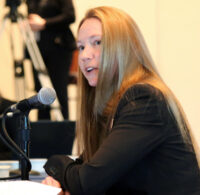BLACKFOOT — An embattled Blackfoot charter school must meet a list of conditions in order to stay open, the Idaho attorney general’s office says.
“I am writing to inform you that your charter has been recommended for conditional renewal,” Deputy Attorney General Leslie M. Hayes said in a Jan. 15 letter to Fred Ball, head administrator of Blackfoot Charter Community Learning Center.
The list of conditions includes:
- Changes to the school’s financial practices.
- Training for trustees.
- Improved academic achievement.

Blackfoot may accept some, all or none of the conditions. If the school refuses, Hayes said, it would need to “present evidence and testimony” at a March 1 hearing with the public charter commission’s seven-member board. The commission oversees more than 40 of Idaho’s charter schools.
Commissioners could approve the recommendations, renew the school’s charter with no conditions or vote against renewal.
“If the commission does not adopt the recommendation, you will still be entitled to a hearing on the matter,” Hayes wrote.
Around 550 students attend Blackfoot, which received more than $2.7 million in state funding in 2016-17.
Conditions accompany investigations into Ball’s schools
Hayes’ letter comes amid the charter commission’s months-long investigation into allegations of financial mismanagement at Blackfoot and Bingham Academy — another public charter Ball oversees, which faces renewal in 2022. Since December, the commission has been investigating allegations of questionable internal controls and financial practices and “inappropriately addressed allegations of sexual misconduct by school employees.”
Commission director Tamara Baysinger said the attorney general’s office is aware of the commission’s investigation. The attorney general’s office is not involved with the investigation “at this point,” Baysinger added.
Idaho law requires renewal of a school’s charter every five years. It’s “standard procedure” for a deputy attorney general to issue renewal letters, Baysinger said, since renewal is a “formal, legal process.”
An Idaho Education News investigation revealed multiple unexplained checks to Ball. These checks included a $22,099.37 payout for “modulars and other expenses.” Ball told EdNews he resold to Blackfoot two modulars he purchased from Salt Lake Community College for the “spectacularly low price” of $16,000, or “what he had into them.” The college says it has no documentation of selling modulars to Ball, though Blackfoot reimbursed him $16,000 for their purchase. Ball has received numerous reimbursements for a wide range of items over the years, from a basketball and a music stand to the modular units.

The school’s business manager, Randy Ruger, also received a series of payouts from Bingham from August 2017 to August 2018, including eight checks, each worth $939.07, all cashed on Aug. 21, 2018. On that same day, Ball cashed a series of his own checks from the school, each worth $855.60. Ball said the successive payments were payroll checks the men decided to hold for months before cashing in order to help the school weather the prospect of a “large number of upfront expenditures.”
Blackfoot and Bingham receive state funding based on average daily attendance. The schools together serve about 750 students, with budgets totaling some $4.3 million.
Renewal recommendations hinge on financial practices
Several of the recommendations for renewal of Blackfoot’s charter revolve around improving financial practices. This includes obtaining a “good” financial standing with the commission by June 30, 2021. First, by July 1, the school will need to demonstrate “consistent, clear implementation” of the following:
- A purchase order system that ensures documented, advance approval of all expenditures.
- Elimination of the use of prepaid credit cards using school funds.
- “Clear” operational and financial separation from both Bingham Academy and an on-site daycare for children of Blackfoot employees.
On Jan. 22, EdNews requested expenditures associated with Blackfoot’s daycare, including cancelled checks and bank statements. On Feb. 1, Ruger sent several checks totaling some $30,000 Blackfoot paid to the daycare’s bank account. Ruger included several checks from Blackfoot to what appear to be daycare employees. However, he did not include documents related to payments made from the daycare’s account.
EdNews on Tuesday morning repeated its request for financial documents from the daycare. Neither Ruger nor Ball have responded.
Other recommended conditions include reaching “good” academic standing with the commission by June 30, 2020, and training for all of Blackfoot’s trustees regarding administrator evaluation, stakeholder communication, and financial oversight by Sept. 1.
Baysinger visited both schools this week
Baysinger and a staff member arrived in Blackfoot Tuesday for a three-day visit to Blackfoot and Bingham.
Baysinger said the visit included interviews with trustees and a chance to obtain documents the commission has requested, but has not yet received, as part of its investigation.

“We’ve reviewed the documents (the schools) have given so far, but they haven’t produced everything,” Baysinger said last week.
On Thursday, Baysinger said both schools expressed “eagerness to correct the identified issues, and some of the necessary changes are already underway.”
The commission will contract with a forensic auditor, she added, to “verify whether public funds were appropriately managed in the past.”
Created by the Legislature in 2004, the Idaho Public Charter Commission is Idaho’s largest public charter school authorizer. It oversees around 75 percent of Idaho’s charters. School districts and universities can also authorize charters.
Stay with EdNews for further developments on renewal of the Blackfoot’s charter.
